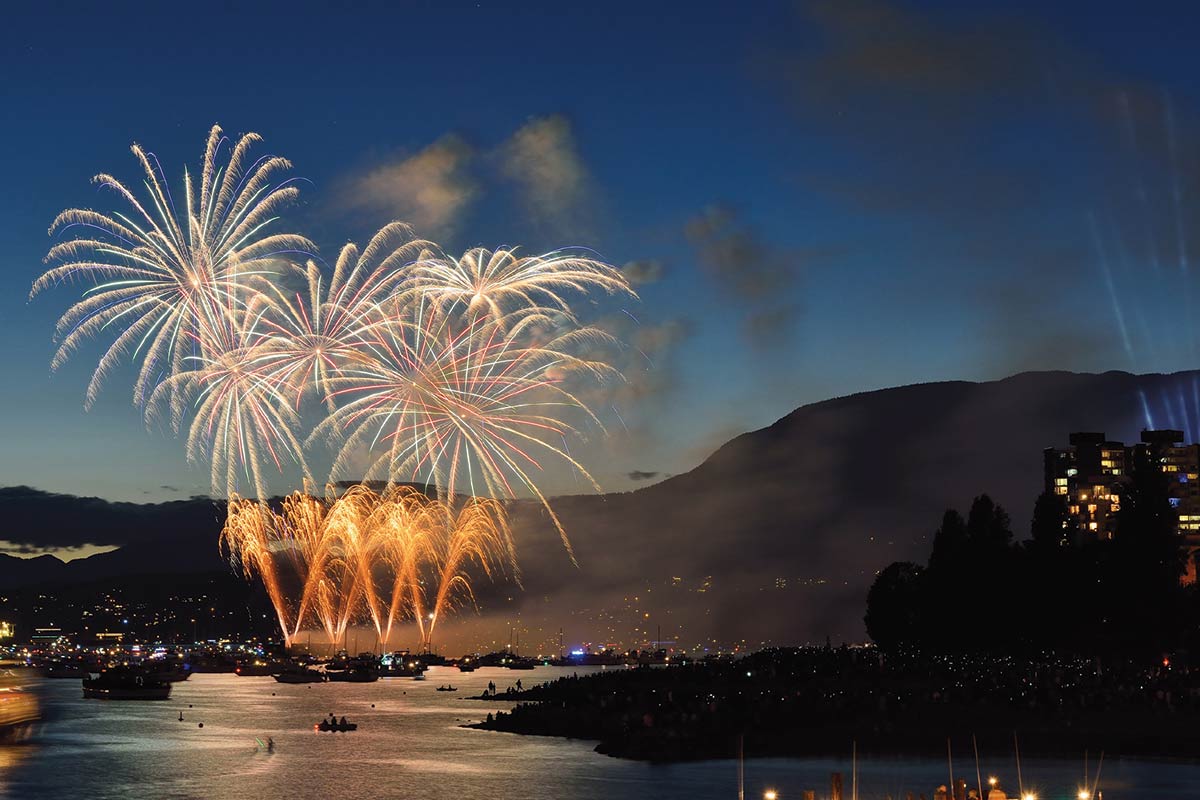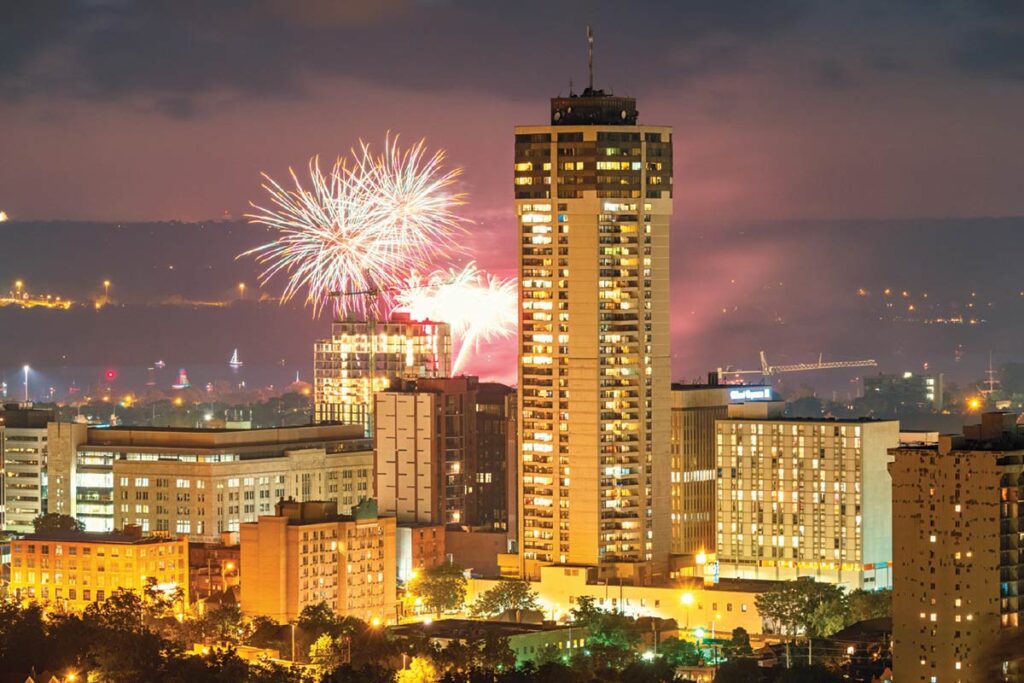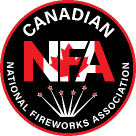Click to Download the Full Publication
Fireworks in Canada
On July 1st, 1867, the British North America Act, known today as the Constitution Act, was established. Along with Military Displays, musical entertainment, and the ringing of Cathedral bells, Fireworks were used to celebrate the Confederation of Canada! From the first Canadian celebration of our independence, Fireworks were used to rejoice and memorialize. Fireworks have been used for centuries for this very reason, and to this day, they remain an integral part of being Canadian. Below are just a few other cultural, religious, or internationally recognized celebrations in which fireworks are used in Canada:
- Diwali or “Festival of Lights”
- Guy Fawkes Night
- Halloween
- New Year’s Eve
- Victoria Day
- Chinese Lunar New Year
- Vaisakhi
- Kaesong (Buddha’s Birthday)
Consumer Fireworks have increasingly gained popularity in Canada and are used by families to celebrate any one of the events listed above. Canadians have built family and neighbourhood traditions around fireworks for years to commemorate or celebrate various events. Some popular examples of these traditions may include:
Birthdays • Weddings • Family Reunions • Mothers/Fathers Day Anniversaries • Memorials • Graduations
Canadians of all walks of life have enjoyed fireworks for generations. The Canadian National Fireworks Association is the leading firework advocacy and safety organization that the industry, governments, and members of the public have relied on to provide educational guidance on how to safely use fireworks, and be responsible neighbours. Unfortunately, municipal governments across Canada have taken it upon themselves to pursue ill-guided bans on the use of fireworks, which can lead to the unregulated and unchecked sale and use of fireworks. This unsafe approach promotes illicit behaviour and takes away from cultural, religious, and other celebratory events Canadians enjoy. This document will outline why banning fireworks outright is not the best approach to ensuring the safe use of fireworks. The CNFA believes that regulated sale and use of fireworks alongside public education campaigns is the best way to ensure Canadians can continue to safely enjoy fireworks for their religious, cultural, and celebratory events.
Banning Fireworks: Creating an Unregulated, Unsafe Market
The Sale of Fireworks
Extensive regulatory, licencing, and safety measures are in place for vendors who sell fireworks. Vendors who sell and use display fireworks (used for large events) must be licenced by Natural Resources Canada, and follow stringent rules set out in the Federal regulations seen here. Further, vendors who sell consumer fireworks, meant for use by the public, must be following the rules set out here. Additionally, municipalities will often require vendors to qualify for and purchase a licence to sell any type of fireworks, including consumer fireworks, for use by the public on stated holidays and special events. For example, see the City of Toronto’s licence requirements here for the sale of fireworks by vendors. These rules are in place to ensure that vendors follow all measures necessary to ensure the product is stored, transported, and used safely. These measures protect consumers, the public, and vendors.
A municipality who bans fireworks is willingly removing themselves from the established framework meant to protect consumers. Given the significance that fireworks play in many religious, cultural, and other significant events, such as Canada Day, it is known that consumers will continue to seek out means of acquiring fireworks. An outright ban will give illicit vendors the opportunity to sell their products to whomever they wish without consideration for the safety of
others.
The Use of Fireworks
Consumers must be at least 18 years of age to purchase and use fireworks. Further, many municipalities set specific dates and times that fireworks can be sold and used. For example, the City of Hamilton has established specific dates, times, and locations where fireworks can be sold and used in the City as seen here. This by-law is meant to protect consumers while allowing the public to continue to use fireworks for their celebrations.
FACTS ON BANS:
- Unenforceable – After Vancouver banned fireworks on Halloween, use continued but police were unable to issue any tickets as police admitted it is very difficult to enforce.
- Bans are Unsafe – Removing a municipality from the regulated market creates opportunities for illicit sale and use of unregulated products with no enforcement mechanism.
- Regulating Use is the Safest Approach – Ensuring the safe sale and use of fireworks through licencing and public safety campaigns is the safest approach.

Example: Vancouver
Vancouver Council voted to ban fireworks on Halloween in 2021 which led to a decrease in usage of fireworks but did not stop the public from enjoying them. The City acknowledged that consumers could simply travel to a neighbouring municipality to purchase fireworks. Police also admitted they were unable to enforce the ban, and zero tickets were issued. “We saw [fireworks], we heard them, we received calls, but we were simply too busy dealing with criminal offences, violent crime and other public safety issues,” VPD Sgt. Steve Addison said. (Hamilton, 2021)
Vancouver’s approach stigmatized those who wanted to celebrate the evening as they had in the past while allowing the illicit market to take over. This unenforceable measure encouraged criminals to ignore any regulations that were in place for vendors prior to the ban and opened an unsafe, unregulated market for fireworks in the city. A regulated marketplace would have allowed for pro-active safety measures to be put in place by way of licencing, restrictions on the sale of fireworks, and public awareness campaigns.
To summarize:
- Vancouver voted to ban fireworks on Halloween.
- Fireworks were still used by the public.
- Police acknowledged that the ban was unenforceable.

Example: Hamilton
The City of Hamilton sought to refine its fireworks by-law in 2022, and instead of an outright ban, the City adopted a measured approach that balanced the public’s desire to continue the use of consumer fireworks with the realities around enforcement.
A staff report on fireworks in Hamilton acknowledged that if a ban were to be put in place, “limitations in the availability of staff to proactively enforce both the sale or display of fireworks” would arise (Moro, 2022). As a result, the City adopted a by-law that dictates where and when a vendor can sell fireworks, requires vendors to acquire a permit, and specifies where and when consumers can enjoy fireworks. This approach took input from the community, the fire department, and other stakeholders on usage and concerns, resulting in a balanced by-law with proactive measures to ensure fireworks are enjoyed in a controlled setting.
To summarize:
- Hamilton reviewed their fireworks by-law and did not side with a ban.
- Regulations were put in place to ensure the safety of the public.
Taking a Measured Approach to the Sale and Use of Fireworks
The CNFA supports and encourages municipalities to take an evidence-based, measured approach to the regulation of the sale and use of fireworks. To ensure the public remains safe while still being able to enjoy fireworks, licensing vendors to ensure they are following federal and local laws in conjunction with public-safety messaging is the best path forward.
A municipality that chooses to ban fireworks is willingly creating an unsafe environment by allowing an underground marketplace to take over from a regulated one. Consumers will continue to seek out fireworks to celebrate their religious, cultural, and special events, so it is in the best interest of a municipality to regulate and license their use and sale.
The CNFA encourages consumers to Be a Good Neighbour!
Enjoying fireworks also means preparing, informing, being respectful, being safe, celebrating, and cleaning up.
Learn more about the CNFA Be A Good Neighbour program here.
Additionally, the CNFA offers a free vendor course which is supported by municipalities and fire departments from across Canada. It covers all the federal regulations vendors need to know when selling consumer fireworks in Canada, and teaches best practices for the transportation, storage, and display of fireworks, as well as product types, usage, and points of sale. You can find the course here.
The CNFA also offers:
- Fireworks Safety Tips
- Information on legal and illegal fireworks
- A video series on how to safely use fireworks
Municipalities are encouraged to reach out to the CNFA for questions regarding their fireworks by-laws and how they can be updated to meet current best practices to ensure the public can enjoy fireworks in a safe, regulated manner.









